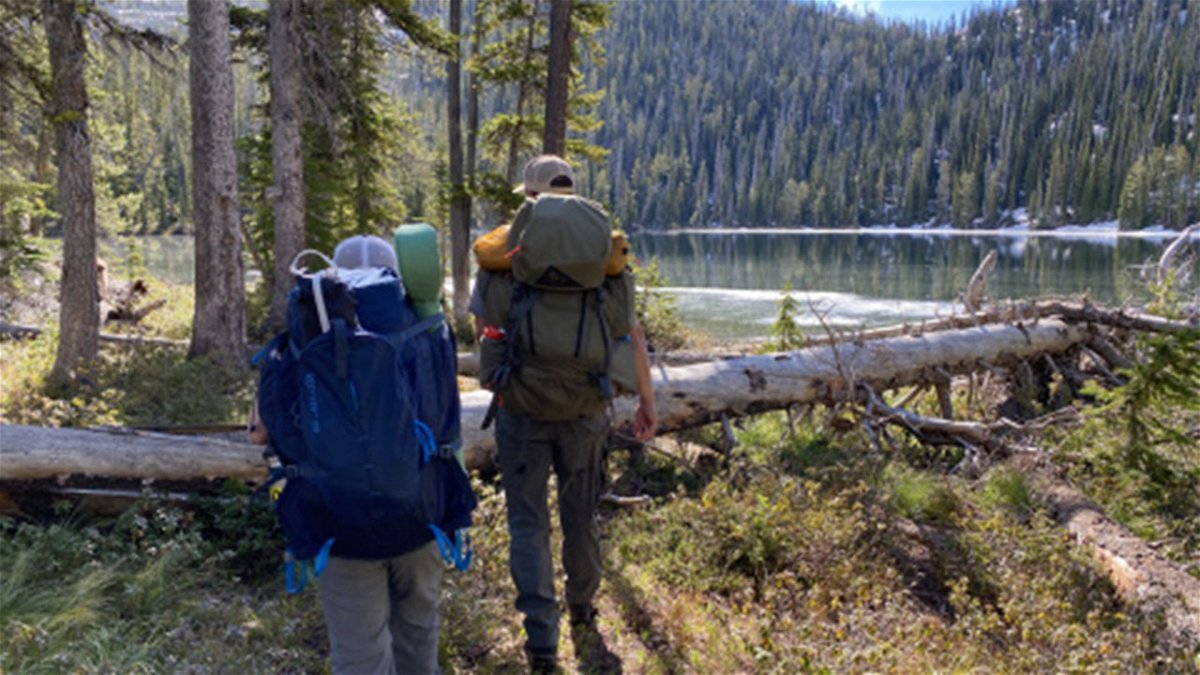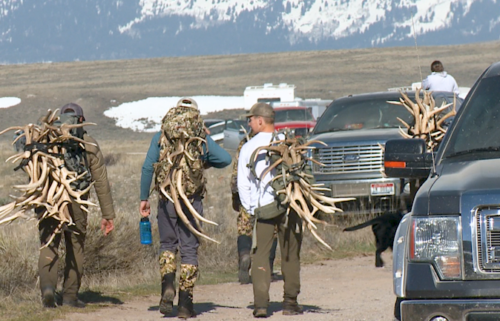10 tips to get you started on a backcountry fishing trip

IDAHO FALLS, Idaho (KIFI) - If you’re unfamiliar with Idaho’s backcountry, it may make you nervous about traveling to the state’s wildest places, but the backcountry and its alpine lakes offer great fishing and amazing experiences in some of the state’s most scenic places.
You may have heard that even a day trip requires a bunch of specialized gear and hard-to-master navigation skills.
It doesn’t.
Yes, the backcountry poses challenges that are different than if you drove a paved highway to a state park, or other developed fishing spot with a nearby town. But it’s nothing you can’t handle, especially if you keep it simple and don’t overreach on your first outing.
Of course, this assumes you’ve done some basic homework and your vehicle is capable of getting you there and back, and you bring essentials to ensure you’re covering the basics. Remember, there are no convenience stores in the backcountry, so you need to be self-sufficient.
The key is to start with a fun, relaxed outing where the odds of success are high, and then build on what you’ve learned for your next outing.
Here are 10 tips to help you get started:
- Keep it simple: For your first outing, don’t stray too far off the beaten path. Maybe head to a place that’s just a little beyond someplace you’re already familiar with. If you’re new to Idaho, consider Idaho’s well-known destinations that have mountain lakes, such as McCall, Stanley, Ketchum, the Panhandle, etc. That remote, hidden lake you’ve heard whispers about can wait until you get some backcountry experience.
- Check current conditions before you go: Check the anticipated weather, road conditions, trail conditions and fire situation before heading out. Find out about rough roads, washouts, downed trees, wildfire closures, snowed-covered trails, or roads closed for repairs during summer to fix those hazards. Some high-elevation mountain roads can be blocked by snow as late as July. On the flip side, wildfires are common during summer, and even a fire dozens of miles away (or even hundreds of miles away) can make your idyllic mountain lake hazy and smoky. You can check on current conditions by calling a Forest Service or Bureau of Land Management office near your destination, and check their websites and Facebook pages for alerts and closures.
- Don’t be a backcountry snob: What does that mean? It means you don’t have to hike for hours to some remote mountain lake to experience alpine lakes fishing. There are many productive and fun lakes you can drive to and car camp and enjoy all the fun of mountain lake fishing from a comfortable, well-stocked camp (or even an RV sometimes). Don’t expect to be alone, but that’s often the only trade off to a lake that you can access by car. The fishing can still be good, the scenery spectacular, and you’ll be comfortable. Regardless of how you get there, remember to pack out your trash and keep the scenery beautiful for everyone.
- When you hike, keep it light: We’re all guilty of this. We are heading into the mountains, so we prepare for the worst and take enough gear to support a military campaign. This is where a little restraint and common sense goes a long way. If you’re only a mile or two from your vehicle, you’re probably 30 minutes to an hour away, depending on the trail, terrain and how fast you walk. You probably don’t need heavy hiking boots and a giant backpack of gear. If your lake is a mile or so away and there’s a trail to leading to it, a pair of lightweight hiking shoes and a day pack should be good enough. A pair of shorts, t-shirt, sneaker or light hikers, a fishing rod, a water bottle, light rain jacket and a few snacks may be all you need for a day hike into a lake if the weather looks good and you’re back before evening when the temperature cools down. Bring your smartphone to help navigate the trail (get a mapping app) and take some photos.
- Explore, experiment, repeat: Learn from your first trip, and after a few more outings, you will figure out what works, what gear you need, and where you like to go. Maybe your next trip is a nearby lake over the first ridge, or a distant lake miles away where there’s no trail. If you’re new to mountain lakes fishing, go in with an open mind and see what kind of fishing you enjoy. Pick your favorite rod and some essential lures or flies, then leave the rest behind.
- Don’t overthink your fishing gear: Not saying that trout in mountain lakes are dumb, (unless they’re brook trout, which can be prolific and always hungry), but you probably won’t need more than basic tackle to catch fish in a mountain lake. The odds, relatively speaking, tend to be in your favor for several reasons. First, the growing season tends to be short and the fish don’t get much fishing pressure so they’re not real wary. They have to feed pretty aggressively to fatten up enough to survive the long winter. Second, there’s usually competition for food, so if one fish doesn’t grab your offerings, another may. Third, mountain lakes are typically fairly sterile, so food may be scarce. It all works in your favor as an angler.
- Load up the cooler: Even on day trips, think of your vehicle as a base camp. It may take a while to drive to a trailhead, so when you get there, eat some food and drink so you’re not starting your hike hungry or thirsty. When you return, have more cold beverages waiting on ice and more food in the cooler. Maybe even bring a camp stove or a grill and have a picnic at the trailhead before you head home. It takes time and effort to get into the backcountry, so make the most of your day.
- Planning your first backcountry camping trip: Unless you’re an experienced backpacker and backcountry navigator, on your first outing, avoid a long, multi-day loop hike. It may be a better option to return to an area you already know and do a fairly short hike to a lake and spend the night there to boost your confidence. Again, it will give you the opportunity to relax, learn the basics and figure out what you really need for a longer stay, or before tackling a longer trek to more remote, unknown places.
- Be creative: Use your imagination and ingenuity to overcome challenges in the backcountry. You can use your cell phone as a combination camera, GPS, compass, flashlight, map, weather forecaster, field guide, etc. Did you know yarrow and mint can repel mosquitoes? Need bait? Catch grasshoppers during your hike in, or search in a creek or along the lake’s shoreline to find natural bait. Use a small fire to cook a fish for lunch. Pick some huckleberries for dessert. One creative angler used a self-inflating, backpacking air mattress as a makeshift float tube to fish from. You probably wouldn’t want to take it into the middle of a large lake, but it might get you closer to a hard-to-reach fishing spot that’s close to shore.
- Mountain lakes are about more than the fishing: If you spend a day, or an overnighter, at a mountain lake and come back complaining because you didn’t catch any fish, enough fish, or big enough fish, you’ve kind of missed the point. Yes, we’re going fishing, so we hope to catch fish, but consider catching fish the icing on the cake of the whole backcountry experience.
If you never go beyond driving to a mountain lake for a day of fishing, there’s nothing wrong with that. But your first trip will likely build a bigger appetite for the backcountry, and you may want to explore a little farther, stay a little longer and check out more places. That will likely mean adding to your fishing and camping gear, upgrading some items and buying specialized gear (plastic poop shovel, anyone?)
Most important, spending your time wisely in the backcountry will build your confidence, increase your comfort level and improve your skills and knowledge to extend your future outing in time and distance. It will also hone your skills so what was once daunting becomes second nature, and the mountains become as comfortable as your own backyard.






